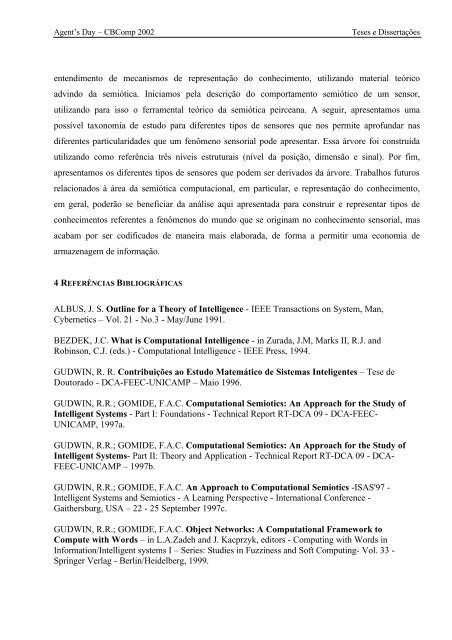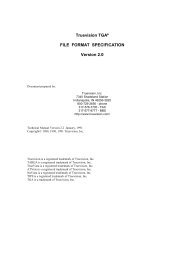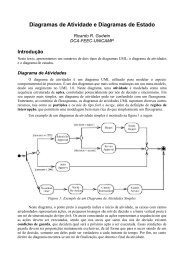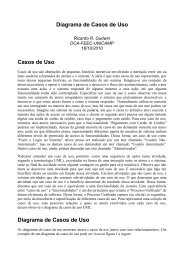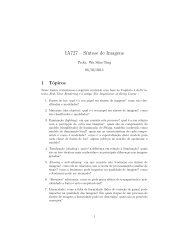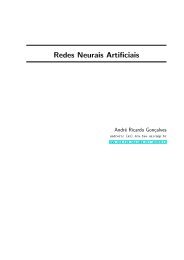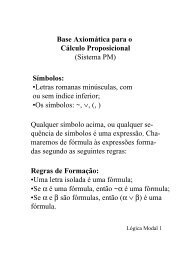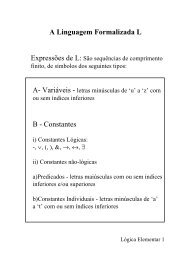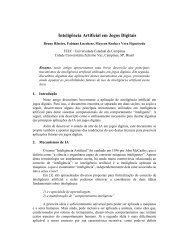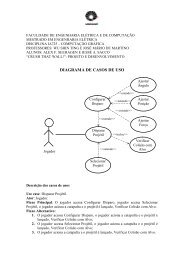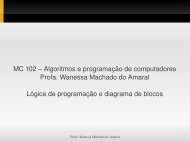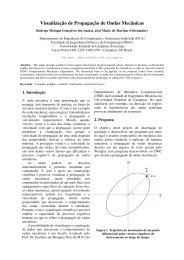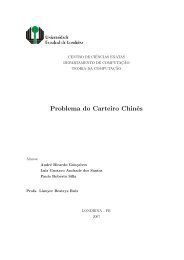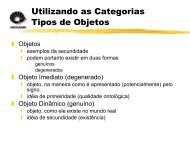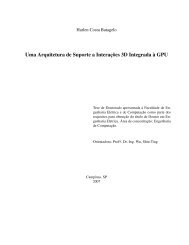Análise do Conhecimento Sensorial segundo a ... - DCA - Unicamp
Análise do Conhecimento Sensorial segundo a ... - DCA - Unicamp
Análise do Conhecimento Sensorial segundo a ... - DCA - Unicamp
Create successful ePaper yourself
Turn your PDF publications into a flip-book with our unique Google optimized e-Paper software.
Agent’s Day – CBComp 2002 Teses e Dissertações<br />
entendimento de mecanismos de representação <strong>do</strong> conhecimento, utilizan<strong>do</strong> material teórico<br />
advin<strong>do</strong> da semiótica. Iniciamos pela descrição <strong>do</strong> comportamento semiótico de um sensor,<br />
utilizan<strong>do</strong> para isso o ferramental teórico da semiótica peirceana. A seguir, apresentamos uma<br />
possível taxonomia de estu<strong>do</strong> para diferentes tipos de sensores que nos permite aprofundar nas<br />
diferentes particularidades que um fenômeno sensorial pode apresentar. Essa árvore foi construída<br />
utilizan<strong>do</strong> como referência três níveis estruturais (nível da posição, dimensão e sinal). Por fim,<br />
apresentamos os diferentes tipos de sensores que podem ser deriva<strong>do</strong>s da árvore. Trabalhos futuros<br />
relaciona<strong>do</strong>s à área da semiótica computacional, em particular, e representação <strong>do</strong> conhecimento,<br />
em geral, poderão se beneficiar da análise aqui apresentada para construir e representar tipos de<br />
conhecimentos referentes a fenômenos <strong>do</strong> mun<strong>do</strong> que se originam no conhecimento sensorial, mas<br />
acabam por ser codifica<strong>do</strong>s de maneira mais elaborada, de forma a permitir uma economia de<br />
armazenagem de informação.<br />
4 REFERÊNCIAS BIBLIOGRÁFICAS<br />
ALBUS, J. S. Outline for a Theory of Intelligence - IEEE Transactions on System, Man,<br />
Cybernetics – Vol. 21 - No.3 - May/June 1991.<br />
BEZDEK, J.C. What is Computational Intelligence - in Zurada, J.M, Marks II, R.J. and<br />
Robinson, C.J. (eds.) - Computational Intelligence - IEEE Press, 1994.<br />
GUDWIN, R. R. Contribuições ao Estu<strong>do</strong> Matemático de Sistemas Inteligentes – Tese de<br />
Doutora<strong>do</strong> - <strong>DCA</strong>-FEEC-UNICAMP – Maio 1996.<br />
GUDWIN, R.R.; GOMIDE, F.A.C. Computational Semiotics: An Approach for the Study of<br />
Intelligent Systems - Part I: Foundations - Technical Report RT-<strong>DCA</strong> 09 - <strong>DCA</strong>-FEEC-<br />
UNICAMP, 1997a.<br />
GUDWIN, R.R.; GOMIDE, F.A.C. Computational Semiotics: An Approach for the Study of<br />
Intelligent Systems- Part II: Theory and Application - Technical Report RT-<strong>DCA</strong> 09 - <strong>DCA</strong>-<br />
FEEC-UNICAMP – 1997b.<br />
GUDWIN, R.R.; GOMIDE, F.A.C. An Approach to Computational Semiotics -ISAS'97 -<br />
Intelligent Systems and Semiotics - A Learning Perspective - International Conference -<br />
Gaithersburg, USA – 22 - 25 September 1997c.<br />
GUDWIN, R.R.; GOMIDE, F.A.C. Object Networks: A Computational Framework to<br />
Compute with Words – in L.A.Zadeh and J. Kacprzyk, editors - Computing with Words in<br />
Information/Intelligent systems I – Series: Studies in Fuzziness and Soft Computing- Vol. 33 -<br />
Springer Verlag - Berlin/Heidelberg, 1999.


